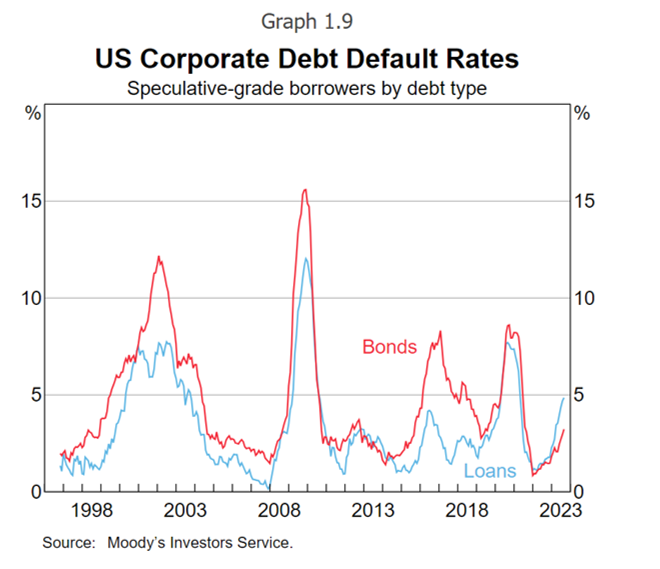RBA warns on high-risk debt default cycle and non-bank pain...
The RBA has not pulled its punches in today's Financial Stability Review, highlighting a sharp increase in defaults amongst illiquid high-yield bonds and private loans. The RBA comments:
After a period of fewer business failures, bankruptcies have risen in a range of economies, including Australia, Europe and the United States. While the increase has generally only seen a return to pre-pandemic levels of bankruptcies, a sharp economic slowdown would amplify this trend. Consistent with rising bankruptcies and tighter credit conditions, default rates have increased for market-based corporate debt, with vulnerabilities more pronounced for lower grade corporations. Lower grade corporate debt is characterised by more variable-rate lending, including for leveraged loans [private debt] in Europe and the United States, and is dominated by sectors exposed to cyclical trends, such as consumer products, real estate, and media and entertainment. Default rates on speculative-grade debt have increased to be above pre-pandemic levels in Europe and the United States, and default rates are higher for variable-rate borrowers. Refinancing risks for lower grade borrowers appear limited in the near term; however, this risk rises sharply over coming years with a peak in expected maturities around 2026. Financial conditions and the state of the economy at that time will be decisive in determining whether this refinancing profile proves problematic...

The RBA further extended its warnings to specifically focus on Australian non-bank lenders, declaring that "non-bank loan quality may come under pressure". The RBA continues:
The outlook for non-banks’ housing loan quality is more challenging than in recent years. In an effort to rebuild margins and lending volumes, liaison discussions indicate that some non-bank lenders are relaxing serviceability requirements and targeting higher risk borrower segments, such as those with less documentation about their finances. At the same time, some non-banks have found it difficult to retain credit-worthy borrowers who have sought to refinance their loans on highly competitive terms with banks. A weakening in lending standards and overall loan quality could lead to more risk concentrating in a part of the financial system where regulators have less oversight. Housing loan arrears for non-banks have risen by more than for banks (to levels recorded just before the pandemic), partly because they lend to borrowers who are more sensitive to economic conditions, such as the self-employed. Non-bank lenders also have a higher share of variable-rate lending so interest rate rises, and associated debt-servicing difficulties, pass through more quickly to their loan book.
These are all themes that Coolabah had been forecasting since late 2021. In my AFR column today, I evaluate the impact of the sharp increase in government bond yields in recent weeks noting that it has "sent shockwaves through lackadaisical valuations of asset classes that price off this risk-free “discount rate”, including listed equities, venture capital, infrastructure, real estate, junk bonds and private credit, which are only reluctantly adjusting to the new normal of structurally elevated cash rates". An excerpt is enclosed below:
If that sounds like hyperbole, consider the judgments of one leading investment bank this week, which wrote to clients to advise that “the rise in US 10-year bond yields to 4.8 per cent is causing havoc among leveraged, growth, rate-sensitive cyclical and bond proxy exposures”.
“For US commercial real estate, the mark-to-market valuation adjustments are significant. Whereas appraisal values point to 10 per cent downside to the Fed’s official benchmark for CRE prices, our proprietary valuation framework based on 10-year real yields and credit availability points to 23 per cent (real) downside,” the investment bank wrote. “We also see Australian real estate stocks as 15 per cent expensive relative to the market and macro, and are underweight the sector.”
According to Green Street, US commercial real estate prices have already fallen about 16 per cent from the record high reached last year, eclipsing the 11 per cent decline during the 2020 recession at the height of the pandemic. Green Street’s pan-European price series has fallen about 21 per cent to date from its all-time high last year, exceeding the 9 per cent fall documented in the 2020 recession.
4 topics

